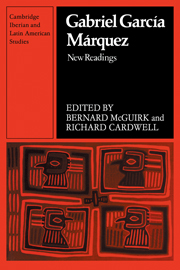Book contents
- Frontmatter
- Contents
- Note on the translations
- List of contributors
- Introduction
- 1 Characterization in the early fiction of Gabriel García Márquez
- 2 Beware of gift-bearing tales: reading ‘Baltazar's Prodigious Afternoon’ according to Marcel Mauss
- 3 The body as political instrument: communication in No One Writes to the Colonel
- 4 Magical realism and the theme of incest in One Hundred Years of Solitude
- 5 Translation and genealogy: One Hundred Years of Solitude
- 6 The humour of One Hundred Years of Solitude
- 7 On ‘magical’ and social realism in García Márquez
- 8 Aspects of narrative structure in The Incredible and Sad Story of the Innocent Eréndira and her Heartless Grandmother
- 9 Language and power in The Autumn of the Patriarch
- 10 Writing and ritual in Chronicle of a Death Foretold
- 11 Free-play of fore-play: the fiction of non-consummation: speculations on Chronicle of a Death Foretold
- 12 A prospective post-script : apropos of Love in the Times of Cholera
- The solitude of Latin America: Nobel address 1982
- Select bibliography
- Index
1 - Characterization in the early fiction of Gabriel García Márquez
Published online by Cambridge University Press: 05 November 2011
- Frontmatter
- Contents
- Note on the translations
- List of contributors
- Introduction
- 1 Characterization in the early fiction of Gabriel García Márquez
- 2 Beware of gift-bearing tales: reading ‘Baltazar's Prodigious Afternoon’ according to Marcel Mauss
- 3 The body as political instrument: communication in No One Writes to the Colonel
- 4 Magical realism and the theme of incest in One Hundred Years of Solitude
- 5 Translation and genealogy: One Hundred Years of Solitude
- 6 The humour of One Hundred Years of Solitude
- 7 On ‘magical’ and social realism in García Márquez
- 8 Aspects of narrative structure in The Incredible and Sad Story of the Innocent Eréndira and her Heartless Grandmother
- 9 Language and power in The Autumn of the Patriarch
- 10 Writing and ritual in Chronicle of a Death Foretold
- 11 Free-play of fore-play: the fiction of non-consummation: speculations on Chronicle of a Death Foretold
- 12 A prospective post-script : apropos of Love in the Times of Cholera
- The solitude of Latin America: Nobel address 1982
- Select bibliography
- Index
Summary
The early fiction has been viewed as the necessary literary preparation for the mature work and especially of One Hundred Years of Solitude. Yet to suggest that the short stories are apprentice pieces is to detract from their real artistry, their subtlety and their narrative techniques. Given their remarkable literary qualities, it is strange that they should have received such scant critical attention. In this essay, I should like to consider one technique, that of characterization, as a starting point for a fuller appraisal of the early stories and, perhaps, of the major works. After all, García Márquez once said in conversation to Miguel Fernández-Braso, ‘in reality one only writes a single book’ (Gabriel García Márquez [una conversacion infinita), Madrid, 1969, p. 44). He went on to reveal his consuming interest in his early characters which culminated in One Hundred Years of Solitude ‘which is the basis of the jigsaw which I have been assembling in my early books. The key, therefore, is to be found in my first works.’ In what follows the analysis is necessarily selective, a starting point for a complete study.
Much of the appeal of the stories in Big Mama's Funeral, as much as in the major novels, lies in the subtlety and allusiveness – even elusiveness – of characterization. Many of his characters are taken from the classical repertoire of the eternally comic, including characters who through their disharmony or absurdity in behaviour or dress, or who by involvement in disguises, tricks, beatings, petty criminality, or indecent behaviour, create humorous situations which can affect all readers at all times.
- Type
- Chapter
- Information
- Gabriel García MárquezNew Readings, pp. 5 - 16Publisher: Cambridge University PressPrint publication year: 1987



